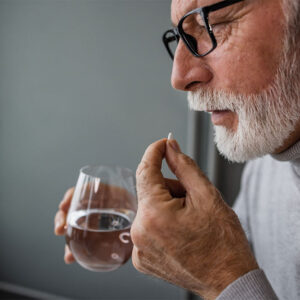
THIS Coronavirus Discovery Could Change EVERYTHING!
We know that the coronavirus is a respiratory infection. And that’s why patients with the most severe cases are being put on ventilators.
But did you know that up to 90 percent of patients put on those ventilators end up dying anyway
Clearly the ventilators aren’t working.
And clearly there’s more to this disease than meets the eye.
Researchers have identified an underlying problem tied to the some of the most understood symptoms of the disease.
And it could change everything.
One of the biggest problems associated with COVID-19 is excessive blood clotting.
Blood clotting is beneficial in moderation. It’s what keeps you from bleeding out if you have a wound.
But if your blood thickens throughout your body, it can cause blood clots that prevent blood from freely flowing through your veins.
And when blood clots for in your heart, brain, and lungs, it can lead to heart attacks, strokes, and pulmonary embolisms.
Blood clots in COVID-19 patients are also causing major problems like kidney failure, heart inflammation, and immune system complications.
One person even had to have his leg amputated.
A study that looked at the autopsies of 12 people who died from COVID-19 found that 60 percent of the patients had a deep vein thrombosis (DVT) that had gone undiagnosed—and for many it’s what ultimately killed them.
DVTs occur when a clot forms somewhere in the body, and then makes its way to your lungs.
Other autopsies have found hundreds of inflammation-causing micro-clots in the lungs of people who died from COVID-19.
In some cases, these DVTs are fatal. For others, the DVTs are responsible for one of the key symptoms of coronavirus: restricted blood and airflow to the lungs, which leads to decreased blood oxygen levels.
It could also be the underlying reason why coronavirus patients can experience heart damage and strokes.
Clotting in the blood vessels just under the skin can also cause rash-like patterns—including the mysterious “COVID toes,” which occur when the patients’ toes turn dark and swell up.
Scientists still don’t know exactly why the coronavirus is causing excessive blood clotting—but we can still use this information to make informed decisions for our health.
And that brings me back to the role of vitamin K in the disease.
Earlier in the week, I told you about a study showing that COVID-19 patients with a vitamin K deficiency were much more likely to have severe cases of the disease.
Vitamin K has blood-thinning properties, so it could be exactly what the body needs to help combat the excessive blood clotting caused by the disease.
It also makes sense that not having enough of it could make you more vulnerable.
That’s why I recommend making sure your body has plenty of blood-thinning vitamin K.
By far, the best K-rich foods include green leafy vegetables.
For added protection, you can start taking a supplement as well. Just make sure NOT to take vitamin K if you’re on a blood-thinning medication like warfarin.
View More Free Articles
Mother Nature's Bone-Building Secret REVEALED
Mainstream medicine has peddled the same old song and dance about osteoporosis for years. Pop some calcium pills… do some jumping jacks… and cross your fingers that your bones don’t crumble like a stale cookie. But what if I told you Mother Nature has been hiding a bone-building secret right under our noses? And we […]
The INCREDIBLE Payoff for Delaying Diabetes
If you don’t know where your blood sugar levels stand, it’s time to get them checked. It’s estimated that one in three adults has prediabetes, yet 80 percent of these folks have NO IDEA they’re in this category. That’s a BIG problem because most people will develop type 2 diabetes within just five years of […]
The Biggest Dementia Risk Factor REVEALED
I’m sure you’re familiar with the Skeleton Dance song… “The foot bone is connected to the leg bone. The leg bone is connected to the knee bone…” It’s easy to think of our bones being linked because we can physically see them. What’s less obvious is that everything else about your health is JUST as […]
It's NEVER Too Late to Kick This Dangerous Habit
You’ve heard it a million times before: “Smoking is bad for you.” If you’re still lighting up, I bet you remember a time when smoking wasn’t just accepted—it was downright fashionable. Remember when you could smoke in restaurants, on airplanes, and even in hospitals? Heck, movie stars even made it look cool and sophisticated. Well, […]
The TRUTH About ED No One's Talking About
It’s a subject most men would rather sweep under the rug… erectile dysfunction (ED). But you’re not alone if you’re having trouble in the bedroom. In fact, ED affects up to 30 million men in the U.S. alone. However, popping a little blue pill isn’t the answer. ED drugs are often just slapping a Band-Aid […]
Don’t Let Muscle Loss RUIN Your Golden Years
For older women, muscle mass can take a nosedive after menopause. This means more than trouble carrying in the groceries. Over time, the decline in muscle mass can lead to mobility problems, balance problems, falls, and ultimately a loss of independence. Staying active is a critical piece of the puzzle. But now, researchers have discovered […]
The Bad Habit Causing Lupus
All autoimmune diseases are on the rise—but lupus is one of the worst. When the condition strikes, your immune system starts to attack healthy tissues. Lupus cases have increased by 60 percent in women and have increased six-fold in men over the past four decades. What’s driving this dramatic increase? Well, we might have found […]
SHOCKING Missing Piece of the Diabetes Puzzle Discovered
I’ve been saying for years that there’s MORE to type 2 diabetes than your weight—or even your diet. Sure, they play their part. But unless you’re adding in THIS missing piece of the puzzle, you could be increasing your risk of type 2 diabetes despite your best efforts to avoid it. And you’ll never guess […]
Ditch the Chips and DEFY Aging
Sometimes, you just want something to crunch on. The craving can send even the most health-conscious among us heading straight to the snack aisle. But before you reach for the potato chips—which can contain all kinds of harmful ingredients—I have a better idea. Try THIS crunchy, healthy snack instead of loading up ingredients that can […]
Is Aspirin DEADLY? (Get the Truth Here)
Old habits die hard… especially when we’ve been led to believe they’re good ones. We were told for years that taking an aspirin a day would lower the risk of heart attack and stroke. But for many, those were empty promises that came with a LOT of risk… and LITTLE reward. That’s why, if you’re […]










